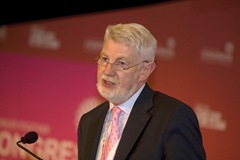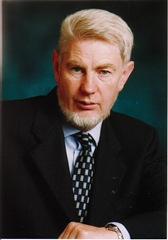A gentler route to recovery: David Begg
 David Begg General Secretary of the Irish Congress of Trade Unions (ICTU) spoke to Meadhbh Monahan about his view on the way to recovery from the current crisis and his frustration with the Government.
David Begg General Secretary of the Irish Congress of Trade Unions (ICTU) spoke to Meadhbh Monahan about his view on the way to recovery from the current crisis and his frustration with the Government.
David Begg has condemned Budget 2010 as “too brutal, too quick and utterly without compassion.” He was “astonished” when talks between the Government and unions were terminated and he believes that the budget cuts will deflate the economy, create more job losses and enhance emigration.
Ireland is facing a “five part crisis” and in order to recover, the Government needs to take a “holistic” approach and recognise that “a country is not just an economy,” Begg insists.
He identifies the five crises facing Ireland as: economic, fiscal, banking, social and reputational.
The fact that tax revenues were 4 per cent below target in the first three quarters of the year and there has been a “collapse in employment”, coupled with the Government’s plans to make cuts of € 4 billion in 2010 and 2011 and further cuts in 2012 and 2013, annoys the experienced trade unionist.
He says that the “crony capitalism” of the Celtic Tiger era has been exposed and has given Ireland a “bad reputation.”
Social partnership
Begg is not enamoured by social partnership and says that its ethos needs to be reformed. “Social partnership should not be called ‘social partnership’ because that would imply a balance of power. There is none.”
He adds: “This utopian concept should be done away with but it is difficult to get away from the public perception of a partnership.”
Begg insists that the Government should extend the recovery plan for several more years to minimise the impact of cuts on workers. But this has been dismissed by Finance Minister Brian Lenihan and Taoiseach Brian Cowen, who say that the EU Commission has already been lenient to Ireland by granting them a longer recovery period than other EU countries.
“The biggest problem in Ireland at the minute is unemployment,” says Begg.
“The problem so far is that measures have been sequential and based on wage cuts.”
He says: “We need to find a better and fairer way of dealing with our problems than what is being mooted by the government at the moment.”
Begg’s plan for national recovery, released in February 2009, called ‘There is a Better and Fairer Way’ was based on the concept of a social solidarity pact.
In terms of employment, Begg believes that there needs to be “much more active labour market intervention.”
Upskilling
He cites the German model, where there are 1.25 million people taking part in state-supported short-term working schemes as a “means to recovery”.
ICTU has asked the Government for € 1 billion to support such a scheme in Ireland but have not been successful in gaining it.
“The German model has worked with direct government intervention to keep people in work. If a company is going through a bad patch the best approach is job sharing and three day weeks, rather than five days,” Begg explains.
He suggests that the Government should cover the two days off work with schemes for “training and up-skilling the workforce.”
He sees the Government putting “huge amounts of money into banks” and accuses them of not thinking in “social terms.”
In order to mend the fiscal crisis, “major adjustments have to take place in the tax base of the economy,” he believes.
“Cutting public expenditure by € 4 billion with a view to reduce GDP to 3 per cent by 2013 is too brutal and too quick. There is a gentler way.”
Begg states that Ireland’s debt to GDP ratio which currently stands at 43 per cent, is the lowest in the EU. As EU countries like Italy are struggling with debt to GDP ratios of 118 per cent and the French President Nicolas Sarkozy has said that France needs to extend its recovery period to 2015, Begg believes that Ireland can “prolong its adjustment.”
He claims that the Government’s recovery plan “is not a choice between rehabilitation or health; it’s a choice between rehabilitation and cold turkey.”
As part of ICTU’s social solidarity pact, it has also called for a three year moratorium on home repossessions, where people cannot pay due to redundancy or unfair dismissal.
ICTU’s pact states that plans to cut social welfare rates should be scrapped.
“We are totally against an adjustment to welfare rates. Social welfare payments are put back into the economy.” To cut them would be “regressive socially,” he comments.
The public should contribute to a national recovery bond, aimed at supporting infrastructure, according to Begg.
“A national recovery bond would be competitive and would be aimed at the infrastructure sector. It would allow the Government to borrow money, while boosting the construction sector and improving the competitiveness of the country.”
In their pre-budget submission, Congress called for a 49 per cent tax on high earners, a new rate of minimum tax for the wealthy, pursuing tax exiles and raising capital gains tax.
Since the Government has refused to take any of ICTU’s suggestions on board, a day of national action was organised for November.
This was to “impress upon the Government that when it came to the budget they will be under no illusions about how the country feel.”
Begg hoped that he could make the Government realise that “a country is not just an economy” but he was disappointed when Finance Minister Brian Lenihan revealed his budget in December.
Trade unions are more relevant than ever during a recession, says Begg.
“Congress is the largest civil society organisation on the island of Ireland, representing and campaigning on behalf of some 832,000 working people. There are currently 55 unions affiliated to Congress, north and south of the border. Any organisation with 832,000 members is very much relevant. The recession has probably made trade unions even more important.”
He outlines ICTU’s core value as being “social justice.” In order to achieve this, ICTU organises workers into trade unions and endeavors to reach a deal with government, employers, civil society organisations, voluntary groups and international bodies.
Established in 1894 as an all-Ireland body which was to be the voice of organised Irish labour, the ICTU has had an illustrious history. It and was involved in the “biggest industrial dispute in Ireland”, the Dublin lock out of 1913. In 1912, partly under the influence of James Connolly, ICTU established a political arm and became known as the Irish Labour Party and Trade Union Congress. After 1916 they lost their two main figures. James Connolly was executed for his role in the rising and James Larkin went to America.
During the 1918 election, the Labour Party famously stood aside and Northern Ireland was established in 1920. In 1930 Congress and the Labour Party separated on an amicable basis only to reunite again in 1959 after years of discussions. The Northern Ireland Committee (NIC) of ICTU was formally recognised by the Northern Ireland Government in 1964.
Begg explains that the NIC had a different role than ICTU because they had to deal with the ramifications of the Troubles. “The NIC took a resolute anti-sectarian stand and are credited with preventing the conflict from spilling over into workplaces.”
ICTU is “very conscious of their non-sectarian nature,” Begg continues.
The NIC has worked
on the issue of flags and emblems and has been involved in the peace process talks. More recently they organised an anti-sectarianism rally in Belfast against the murders of the two soldiers at Massereene Barracks, PSNI constable Stephen Carroll and Catholic man Kevin McDaid who was beaten to death in Coleraine.
“We still work across the divide,” said Begg.
Returning to the economic crisis he warns in conclusion: “If the Government continues with their fiscal cuts they are committing suicide.”
Aged 58, Begg has lived in Rolingstown,
North County Dublin all his life.
He has been General Secretary of the Irish Congress of Trade Unions for almost nine years.
Prior to that he was Chief Executive of Concern Worldwide. Begg claims this was “a wonderful experience” where he was responsible for ensuring that the charities 3,000 workers had the means to carry out their work in 27 countries, usually in sub-Sahara Africa and South Asia and that they were getting reasonable results on the ground.
Begg is also a Director of the Central bank since 1995, (where he chairs the Audit Committee). He is a Governor of the Irish Times Trust, a non-executive Director of Aer Lingus, a member of the National Economic and Social Council (NESC), a member of the Advisory Board of Development Co-Operation Ireland and he sits on the executive committee of the European Trade Union Confederation (ETUC).
Known for quoting Noam Chomsky and the Bible, Begg’s table is piled high with the daily newspapers and his bookcase contains books such as ‘Political Quotes’.
He has three children: two sons and a daughter, and is grandfather to two grandchildren.






